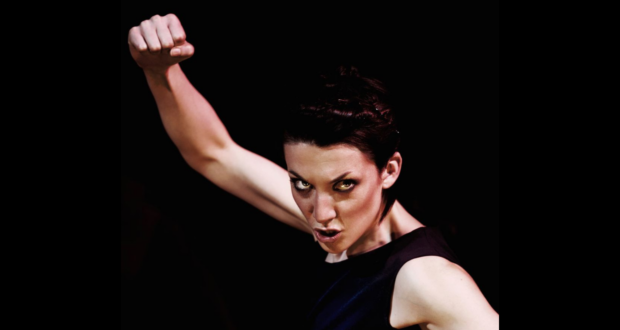Pleasance Dome – Queen Dome
An account of the Trojan War through Medusa’s eyes, Beautiful Evil Things questions female stories in Greek mythology and how they are told. Summary
Rating
Good
For seventy-five minutes, Deborah Pugh retells myths like the ancient Greeks would have done. Her storytelling is amplified by her expressive face and powerful acting. Yet, at times it is hard to keep up.
The Pleasance Queen Dome is a larger space than most Fringe venues and Pugh takes full advantage of this; she energetically moves around, making use of every corner. There are red cables arranged in a circle around the stage. These appear arbitrarily placed, but as the show progresses, Pugh incorporates them as representations of the snakes from Medusa’s head. This is particularly effective when she shoves them in a sack to symbolise the moment when Perseus thrusts Medusa’s head in a bag.
The circular outline of the red cables also acts as the ring rope of a boxing ring. This is employed when Hector fights Paris and Archilles fights Agamemnon. Pugh undertakes the challenge of solo fight choreography but it doesn’t quite achieve the desired effect. Nevertheless, it provides her with the opportunity to deliver the best and most memorable line of the show: ‘The great Achilles keeps on a-killing’.
There are several microphone stands placed at the back of the circle, yet the number of these feels unnecessary. Pugh cleverly uses a stand to signify a sword, bow, axe and walking stick but does not need the other stands to do so. She uses the microphone both effectively and inadequately. For instance, the show starts with some weird and unnecessary snorts, followed by high trilling tones. These additions feel out of place and cheapen the impressive acting. The microphone amplifies these odd noises and the sound mixing sounds subpar. However, when Pugh plays different Gods, she uses the microphone to distort her voice, something that works well.
Lively beats under Pugh’s speeches help the narrative progress. Likewise, the lighting aids her storytelling. Whenever we are taken back in time, the light becomes brighter, as opposed to the darker tone of the present day. This represents Medusa’s sad fate: in the past she had independence, whereas in the present day her head is stuck on Athena’s shield.
The costumes are a little too simplistic: Pugh wears a black suit, complemented with sparkly red socks. Her hair is styled wavy to represent Medusa’s snakes, and we know she is playing Medusa, as she wiggles her fingers to represent the snakes hissing. However, it is difficult to keep up with the characters she is playing, as her costume remains the same throughout. Pugh’s accent does change, but there are too many mythological Gods and Goddesses to keep up with. A visual aid to signify different characters would certainly help.
There are plenty of comical moments. For example, when Zeus impregnates Danaë the event is described as a “golden shower” (and Zeus actually appears as golden rain). Additionally, when Medusa introduces Athena as “long term misogynist, Athena”.
Pugh raises important questions about how women are treated and presented in Greek mythology. It is unusual to see these stories told from a female perspective, which adds an intriguing layer to the discussion. This is a fantastic idea in principle, but the show needs a bit more work to aid the storytelling.
Co-created by: Deborah Pugh and George Mann
Directed by: George Mann
Set and costume design by: Katie Sykes
Lighting design by: Ali Hunter
Produced by: Ad Infinitum
Beautiful Evil Things plays at the Pleasance Queen Dome until 27 August. Further information and bookings can be found here.
 Everything Theatre Reviews, interviews and news for theatre lovers, London and beyond
Everything Theatre Reviews, interviews and news for theatre lovers, London and beyond



